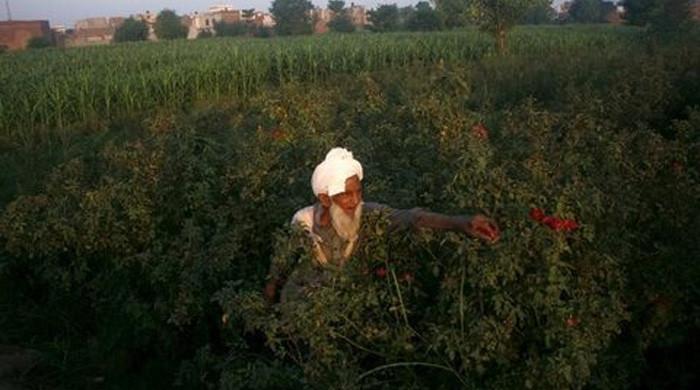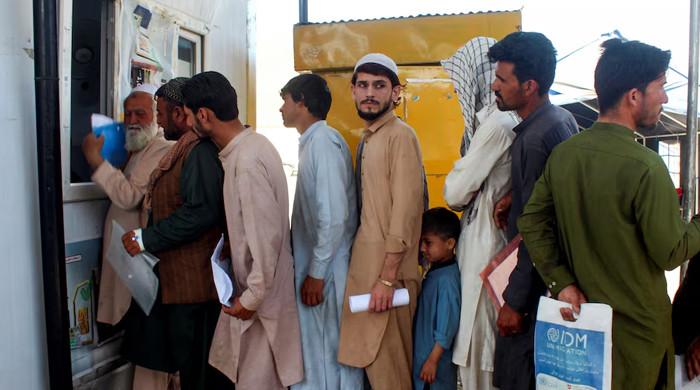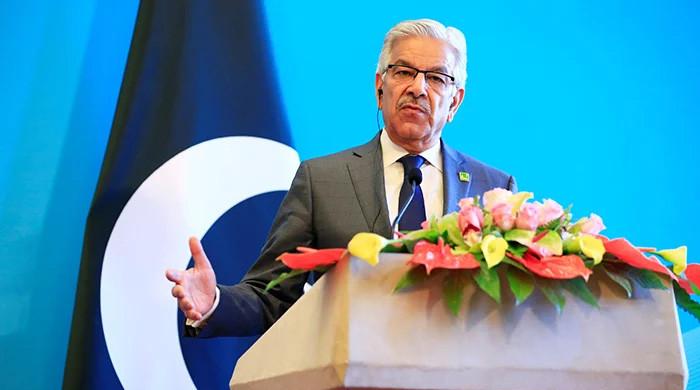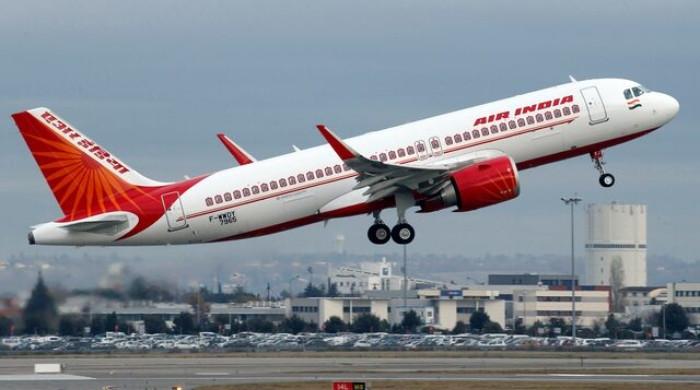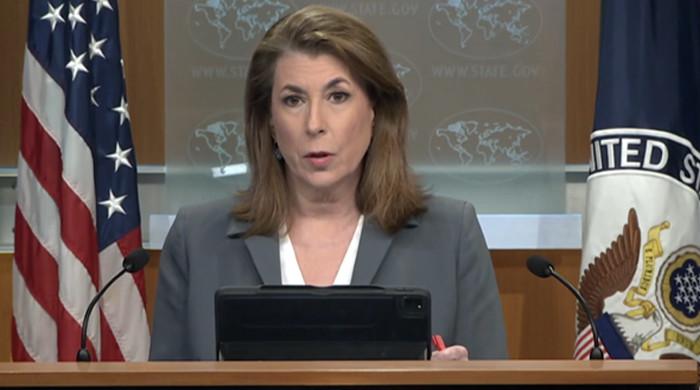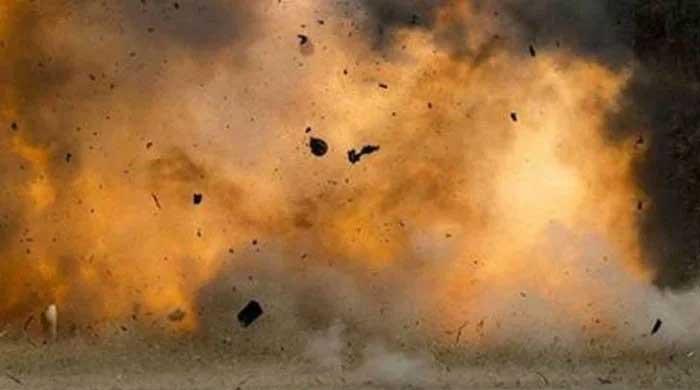Canal protests persist across Sindh despite PM's assurances
Khairpur lawyers’ protest enters eighth day; court lockouts continue in Karachi
April 25, 2025
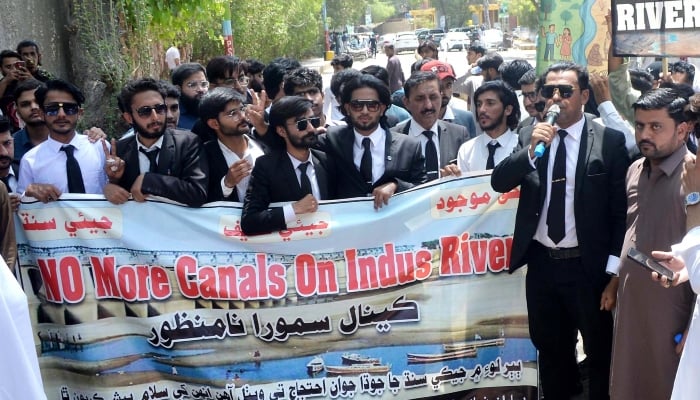
- Civil society calls for president, PM to sign revocation document.
- Ghotki trade disrupted, vehicles stranded amid road closures.
- Dadu, Mehar, Daharki among key protest flashpoints in Sindh.
Despite Prime Minister Shehbaz Sharif’s assurances that no new canals will be constructed without consensus, protests across Sindh against the federal government’s controversial six-canal project from the Indus River persist.
Lawyers, nationalist groups, civil society, and political leaders continue to hold sit-ins and strikes across multiple districts, demanding the project’s formal cancellation through a binding notification.
In Khairpur, the lawyers' sit-in at Babarlu Bypass on the National Highway reached its eighth day on Friday, drawing participation from bar councils across Sindh.
Khairpur Bar leaders reiterated their demand for a formal notification cancelling the project, warning that demonstrations would not end until then.
Karachi also witnessed major disruption as the Sindh Bar Council continued its province-wide strike, with city Court courtroom lockouts entering the fourth consecutive day.
Hundreds of hearings were adjourned, and undertrial prisoners were not presented in court, causing distress among litigants. However, proceedings at the Sindh High Court continued as normal.
Karachi Bar Association warned that the protest will continue until the notification for canal construction is withdrawn.
Additionally, lawyers staged a protest on MA Jinnah Road, disrupting traffic before concluding their demonstration later on.
In Ghotki, key highways and border crossings between Sindh and Punjab remained completely shut, with two major sit-ins continuing on the National Highway at Daharki and Kamo Shaheed, now in their sixth and third days, respectively.
Goods transport across the provincial border has been paralysed for almost a week, stranding hundreds of vehicles. “All routes from Punjab to Sindh are blocked. Our aim is not to inconvenience the local people,” a Sindh Bar Council member said.
The sit-in by nationalist organisations at Gahi Mahesar Chowk on the Indus Highway in Mehar concluded after traffic between Karachi and Larkana was restored.
However, a simultaneous protest under the Muttahida Dehaat Ittehad banner in Dadu drew participation from lawyers, civil society, and farmers, including Bar Association office-bearers.
Meanwhile, in Hyderabad, the Hyderabad Union of Journalists organised a protest camp outside the Press Club, which drew a wide range of speakers from Sindh’s political, social, literary, agricultural, and business communities.
Participants condemned Indian water aggression and demanded cancellation of both the canal and corporate farming projects. They insisted that the cancellation notification must be signed jointly by the President and Prime Minister.
Among the speakers were senior figures such as Maula Bux Chandio (PPP), Advisor Abdul Jabbar Khan, journalist Jami Chandio, Ayaz Latif Palijo, Sahibzada Zubair (Milli Yakjehti Council), businessman Adeel Siddiqui, and others.
They stated that the issue of water affects every individual who drinks from the River Indus.
Breakthrough meeting between Shehbaz, Bilawal
The ongoing protests come a day after PM Shehbaz and PPP Chairman Bilawal Bhutto Zardari held a high-stakes meeting in Islamabad on Thursday, following weeks of escalating unrest across Sindh.
At a joint press conference, the premier announced that no canals would be constructed unless there is consensus in the Council of Common Interests (CCI). He confirmed that the next CCI meeting on May 2 would formally endorse the agreement reached with the PPP.
The breakthrough followed growing tensions between the PPP and PML-N, with the PPP accusing the federal government of undermining Sindh’s water rights through unilateral canal development.
Bilawal, joined by Sindh Chief Minister Murad Ali Shah, thanked the Prime Minister for accepting the PPP’s demands and reaffirmed that no project would proceed without provincial consensus.
CM Shah called the agreement a “major victory”, saying the PPP had consistently maintained the project went against Sindh’s interests. He welcomed the scheduled CCI meeting and expressed confidence that the project would be formally scrapped.
The controversial plan to divert six new canals from the Indus River first gained national attention earlier this year when Punjab Chief Minister Maryam Nawaz launched the Green Pakistan Initiative in Cholistan, sparking fears of water scarcity in Sindh.
In March, the Sindh Assembly unanimously passed a resolution opposing the project, while nationalist parties, including the Grand Democratic Alliance, mobilised mass rallies in Karachi, Sukkur, Nawabshah, and Daharki.
Though the federal government has signalled a willingness to walk back the canal plan, protesters across Sindh remain unconvinced, insisting that only a formal cancellation notification signed by both the prime minister and president will end the movement.




